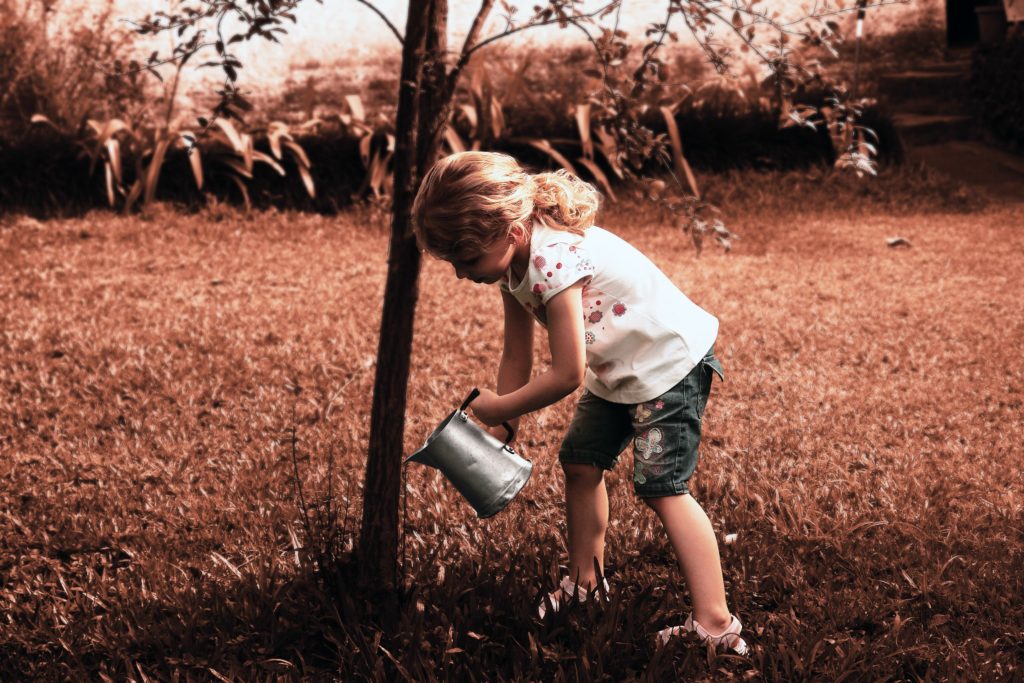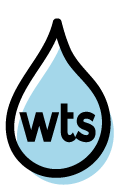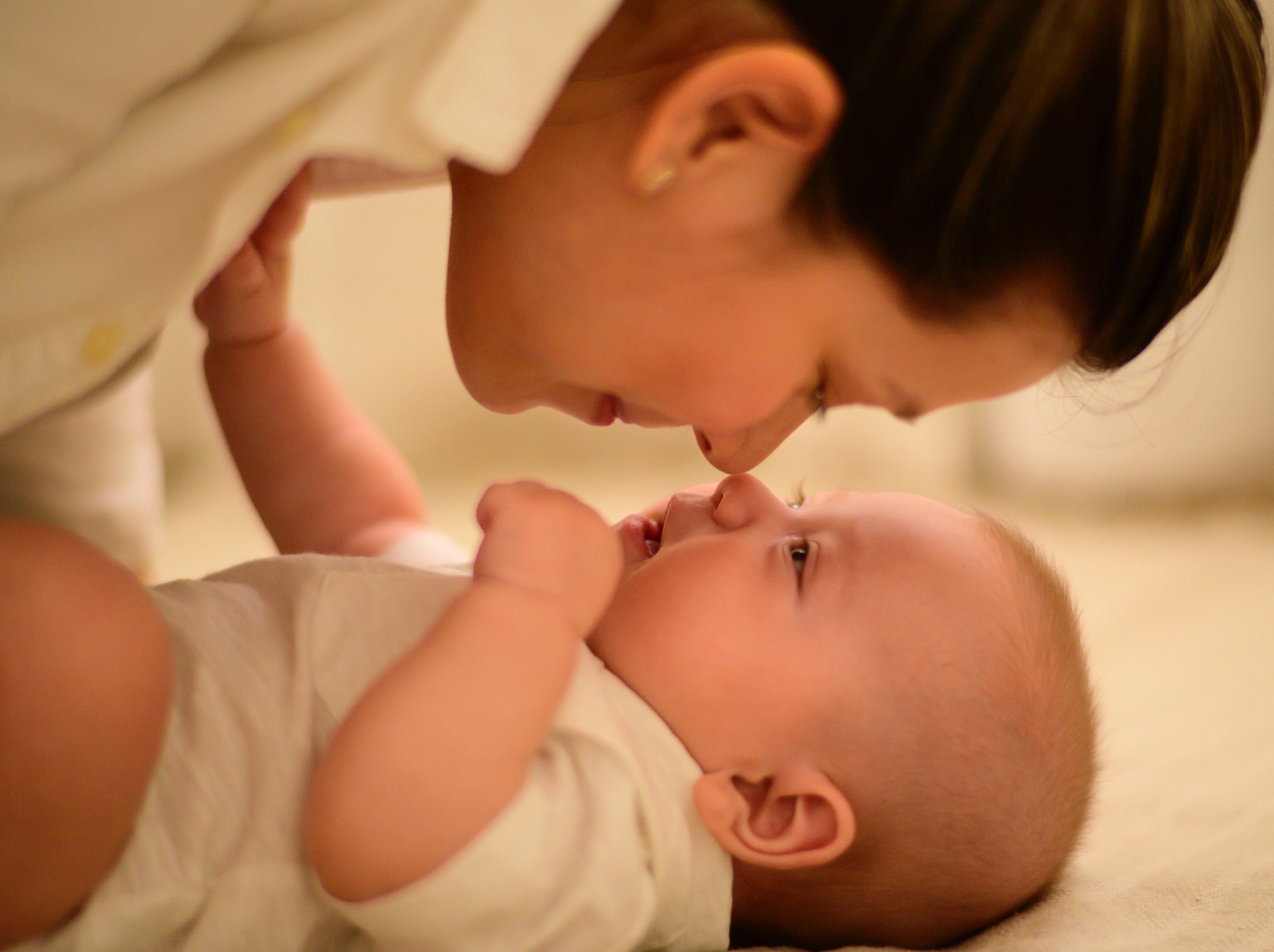| Table of Contents |
|---|
| When will my baby talk? |
| What is baby doing? |
| Let’s Water the Sponge! |
This is one of the most exciting milestones for parents – hearing their child say his or her first words! It is an exciting and momentous occasion to look forward to. Your child is rapidly developing by the day and soaking in everything around him. Your actions, words, and intonation are all becoming ingrained within your child’s mind. Are you wondering when you can expect your little one to start saying something to you with his voice instead of gestures? Would you like to know more about a child’s speech development in general? Are you wondering what you can do to help baby start talking? If so, this series of posts (early skills, babbling, and speaking in words) will likely be helpful for you!
When will my baby talk?
That is a great question! I think that something to keep in mind is that absolutely everything regarding childhood development falls on a spectrum. As such, there is no “cut-and-dry” answer. However, that being said, we are fortunate to have tons of fabulous researchers out there aiding us in gauging the age-range in which milestones occur.
Research shows that a majority of children will begin saying words or word approximations between the ages of 10 and 18 months of age.
Are you wondering what counts as a word or a word approximation? If you’re not certain about what that means or have questions, check out my post about what’s in your lexicon.
If your child has not yet started saying words around 18 months of age and you are worried, it would be wise to talk to your pediatrician and see if speech therapy is recommended at that point in time. Never be afraid to be an advocate for your child. Your child’s mind is rapidly developing between birth and age three years of age, so it is considered best practice to get your child in for therapy as soon as possible, rather than wait and see. Take into consideration that It will likely take time to get scheduled in for an initial evaluation and to find a time that works for ongoing therapy, if it is recommended. Your child might be doing just fine and not need therapy but it is always best to put a worrying parent’s heart and mind at ease!
Something to keep in mind is that regardless of the level of support that you provide your child, each child truly is different and takes his time in developing. My oldest son did not start talking until he was about 14 months of age and as an SLP, I was over-analyzing everything that he did. I was waiting on pins and needles for him to start talking – I am a speech therapist after all, and I have to admit my ego became rather bruised when he was not talking right at the 12-month mark! Lucky for me, I did not have to wait too much longer for him to say “mama”, “dada”, and then a quite unconventional first word, “cheese!” Haha, what can I say, my kid really loves his cheese!
All that being said, give your baby time and remember that childhood development is not a race. It is hard to watch other kiddos the same age as your child develop skills that your child has not yet acquired. I know because I have been in that boat. I have been the parent who compares my child to other children. I have learned that it is not a race, so slow down and breathe. If you’re here reading this, then you are searching for resources, help, and answers and I commend you for that! Hopefully you will find some of the answers you are looking for here.
What is baby doing?
So maybe your child is talking and maybe he isn’t. Regardless of where you are in your journey with childhood speech development, you might be concerned about all the things that he isn’t doing at the moment. Part of our job as parents, and as my job as a clinician, is to think about everything that your child can do. Once we have established what he is able to do, then we can figure out what the next achievable benchmark might be. Here are some things we can think about before tackling speaking:
- Does my child respond to sound? This one is important because if your child is not responding to noises, then maybe he isn’t hearing correctly. If he can’t hear, then it would be quite challenging for him to develop speech.
- Does my child’s face have proper muscle tone? This might be difficult for you to assess as a parent since you see your child’s perfect and sweet little face on a daily basis. Check for symmetry in the face and low muscle versus high muscle tone. If you have any doubts about muscle tone, it would be best to talk to a pediatrician about this as proper muscle tension is a prerequisite for speaking.
- Is my baby mimicking me? Being able to copy and mirror what mom and dad do is an important benchmark for achieving speech. See if your child is attempting to do things that you do. For instance, stick your tongue out at your baby and see if he attempts to do it back to you (this can provide for several minutes of endless entertainment!) Other things you can try with baby include waving hands/arms, clapping, playing peek-a-boo.
- Is my child reaching for me/reaching for objects? If so, this is a sign of nonverbal communication. Even though your child might not be speaking just yet, he may be trying his best to communicate with you by reaching for what he wants.
- Is my child pointing to things? Similar to reaching for people and objects, see if your child is pointing to anything. The difference between a point and reaching is subtle but noticeable. A child is considered to reach for something when he uses his hand in an open manner. Whereas with pointing, he will extend his pointer finger and keep the rest of his fingers closed to indicate what he wants.
- Does my child vocalize when he points to/reaches for objects? Even though your child might not yet be able to speak, observe whether or not he is able to vocalize (e.g., says, “ah, ah” when pointing). This is a precursor to speaking in words and shows that your child has the desire to talk.
- Does my child say any sounds? If so, which ones? Consonants/vowels? Take inventory of this as it will be an important tool to give your child the support he needs to begin speaking. Read through these blog posts about early speech sound development for some tips:

Let’s Water the Sponge!
Okay, so now that you have carefully observed and thought about some things that your child can do, here are some tips to continue to lay the foundational groundwork for speaking:
1.) Auditory Bombardment: Consistently say the same few words over and over again throughout the day, in order to give maximum exposure to the child. For instance, if you wanted to teach the child the word “pig”, then you could play with a farm set and pretend to be the “pig”. You could say, “Look at the pig”; “The pig is eating”; “Pig says oink”. Later on in the day, you could read a book and point out the pig. Sometimes you could just say the word over and over, “Pig. Pig. Pig.” Other times, you can add words to go with it, “Pink pig. Pig oink. Piggy runs.” Focus on two or three nouns per day and keep repeating them.
2.) Narrating what you are doing: Talk about what you are doing when you are with your child so that he can start to learn what types of actions are taking place in his environment. For example, carry your baby around your house with you and talk to him. Point out different pictures on the wall and tell him what room you are currently in. You could say, “Now we are in the kitchen. This is where we cook. Cook and eat. Mmm. Eat yummy food in the kitchen. Bananas, apples, pears. Lots of good food.” See if he engages and listens to you while you talk to him. You can also talk to him while you change his diaper or take him shopping. Keep him in-tune with his environment and surroundings.
3.) Sing Nursery Rhymes: Yes, those oldies but goodies, such as “Old McDonald Had A Farm” are helpful to sing to baby. For younger kiddos, or ones who are working on babbling, try replacing the words with syllables. If you were to sing “Row, Row, Row Your Boat” to your child, pick an appropriate syllable, such as “ma” and sing the song, “Ma, ma, ma, ma, ma…” This will help baby learn sounds in a fun and entertaining way. See additional blog posts about speech sound development in order to decide what syllable to use. Your kiddos will love nursery rhymes. This website has an extensive list of nursery rhyme examples!
4.) Go out in the community: Oftentimes, local libraries will host a free “infant storytime”, which is great for building motor skills and social skills. It is healthy to introduce your child to other children at a young age. Join a local Facebook group and see what is going on, or check out MOPS or PEPS if it is available in your area. If you are religious, then churches typically host a mom’s group during the week. There are also zoo and museum memberships that pay for themselves after a couple of times of use.
5.) Read to your child: Article after article has shown the positive impact of reading to children from a young age. Some days it might be easier to read to your child than others. Personally, we have incorporated reading into our children’s bedtime routines. It gives them something to look forward to before going to bed and it puts my mind at ease knowing that if we had an insane day that we still had time to slow down and bond with our children before they fall asleep. Find your groove and whatever works for your family!
6.) Play games: Your little one is still a baby, but babies love attention! Of course “peek-a-boo” is a classic for baby. You’ll be surprised at the games that you will naturally invent with your little one that makes him giggle! Just using a straw to blow bubbles in a glass can provide hours of entertainment! Or ripping up a sheet of paper like this dad did after getting a rejection letter. The sky is the limit when it comes to inventing interactive games with your little one!
7.) Blow bubbles: Nothing is as magical to a child as watching a bubble float by in the air. See if your child will engage with you as you blow bubbles and reach for them to pop them.
8.) Pull out some problem-solving toys: Those shape-sorters and stacking rings are great for teaching problem-solving! Even a toy that requires a baby to push a button to make something happen will teach cause-and-effect. Your child will learn to recognize “If I do X, then Y will happen.” There are several amazing toy options out there! Not sure what to get? Check out my blog post on toys for early childhood development!
9.) Play music: There is a link between music and language in the brain, as cited in the abstract of this study. According to the abstract, preschool children were split into two separate groups where one received computerized training in visual art and the other training in music.
” After only 20 days of training, only children in the music group exhibited enhanced performance on a measure of verbal intelligence, with 90% of the sample showing this improvement.”
Sylvain Moreno et al.: Short-Term Music Training Enhances Verbal Intelligence and Executive Function
Take advantage of what studies have shown and introduce your child to music if you haven’t already. Classical music, Nursery Rhyme songs, and our personal favorite, Caspar Babypants, are all great springboards! Share whatever music you enjoy with baby (well, depending on what you listen to, maybe the inexplicit version, haha!)
10.) Take some time for yourself: Raising children is a lot of work whether you are a working parent or a stay-at-home parent. Remember to take life with baby one day at a time. Enjoy all of those small moments that make you smile. Your baby is precious and perfect and will likely drive you crazy with all of his talking. Cheers to you, moms and dads for being your child’s biggest champions!
We’ve covered some basics in this post, but stay tuned for additional posts!
Please feel free to drop a comment below! I’ll be sure to get back to you soon!


